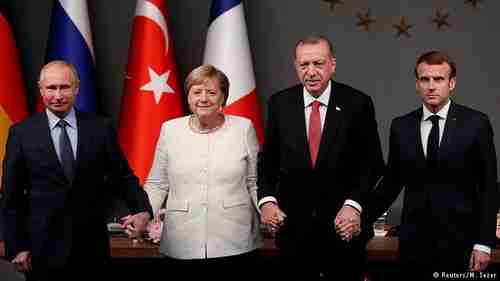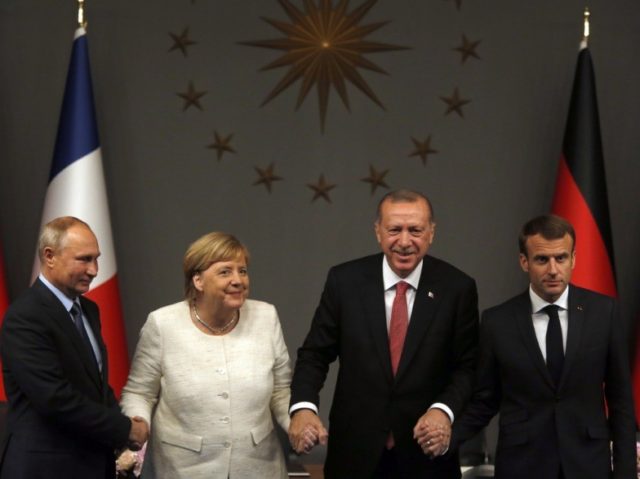This morning’s key headlines from GenerationalDynamics.com
- Remembering Previous Syria ‘Peace Conferences’ and ‘Peace Plans’
- Syria Peace Summit Demands Political Solution in Idlib
Remembering previous Syria ‘peace conferences’ and ‘peace plans’

Leaders holding hands: Vladimir Putin, Angela Merkel, Recep Tayyip Erdogan, and Emmanuel Macron (Reuters)
How many “peace conferences” and “peace plans” have there been since 2011, when Syria’s president Bashar al-Assad launched his genocidal war against his historic Sunni enemies, including the Palestinians in refugee camps, targeting women and children in marketplaces, schools, and hospitals?
The first ones began in 2012 with the U.N. Security Council appointing a series of U.N. envoys to Syria. The first was former U.N. Secretary-General Kofi Annan, who came up with a six-point peace plan that I described as “farcical” on the day it was announced. ( “22-Mar-12 World View — U.N. Security Council adopts farcical ‘peace plan’ for Syria”)
The first of the six points says that Syria commits to work with Kofi Annan “in an inclusive Syrian-led political process to address the legitimate aspirations and concerns of the Syrian people.” Al-Assad actually agreed to the plan, and then ignored it. He made a complete fool of Annan.
The so-called “peace plan” actually made things worse in Syria because it provided cover for al-Assad to continue his slaughter while claiming to be negotiating peace. Similar things happened with all three U.N. envoys: Kofi Annan, Lakhdar Brahimi, Staffan de Mistura. They were all useful idiots, played by al-Assad as complete fools, humiliating themselves and the United Nations. As I wrote in “3-Aug-12 World View — Kofi Annan resigns in failure as Syria envoy”, Annan was bitter and angry when he resigned, blaming his decision on what he described as Syrian government intransigence, on increasing militancy by Syrian rebels, and on finger-pointing and name-calling by members of the United Nations Security Council.
Two weeks ago Staffan de Mistura announced that he would step down. He blamed Bashar al-Assad for blocking the peace process.
It was during the tenure of the envoy Lakhdar Brahimi that I learned what the term “proximity talks” means. The way this works is that the two sides do not actually talk to each other – if they did, they would probably end up killing each other. Instead, the two sides remain separated in different rooms, and each side only talks to Brahimi, who goes back and forth between the rooms.
Then there were the completely fraudulent so-called “Astana talks,” which were led by Russia and took place in Astana, Kazakhstan, or sometimes in Sochi.
The Astana talks split western Syria into four “de-escalation zones” or “ceasefire zones.” Russia promised there would be no fighting in any of these zones. In the case of three of them, al-Assad and Russia violated the agreement and turned each of them into a full-scale genocide zone.
There is only one de-escalation zone remaining: Idlib Guardian (London) and Reuters (17-Oct)
Syria peace summit demands political solution in Idlib
On Saturday, Turkey’s President Recep Tayyip Erdogan led peace talks in Istanbul, Turkey, with leaders of Russia, France, and Germany. In addition to Erdogan, Russia’s President Vladimir Putin, Germany’s Chancellor Angela Merkel, and France’s President Emmanuel Macron were present.
The peace conference was considered a diplomatic victory for Erdogan because he believes that he can get more leverage against Russia and Syria if the Europeans support him.
Syria was not present because Bashar al-Assad is never present at these peace conferences since he always ignores them, anyway.
The U.S. was not present at the peace conference. According to one analyst, the Europeans are furious at Donald Trump for pulling out of the Iran nuclear deal and for the tariff policy and did not want the peace conference to turn into a pure Trump-bashing conference, so they did not invite the US.
The purpose was to make the ceasefire in Idlib permanent. There are over three million people in Idlib, and half of them are displaced people who fled al-Assad’s violence in the other three de-escalation zones. Of the three million civilians, there are an estimated 60,000 or so anti-Assad rebels in Idlib, including both “moderate” rebels and jihadists in the al-Qaeda linked Hayat Tahrir al-Sham (HTS), formerly the al-Nusra Front.
Bashar al-Assad has made it clear that he plans an assault on Idlib and is willing to kill three million people to do so since he considers them all the be “terrorists.” If there is an assault on Idlib, there will be a massive humanitarian disaster and hundreds of thousands or millions of people will pour across the border into Turkey, which is already hosting 3.5 million Syrian refugees. Some of the Idlib refugees will undoubtedly continue on into Europe, resulting in a new European migrant crisis.
That is why Merkel and Macron are at the meeting, calling for a political solution that makes the Idlib ceasefire permanent. And that is why the meeting is considered a diplomatic victory for Erdogan since he thinks that Merkel and Macron will pressure Putin into agreeing to a permanent ceasefire.
On September 17, Erdogan and Putin met in Sochi and reached an agreement to stabilize Idlib. A buffer zone would be set up, with the Syrian army on one side and the rest of Idlib on the other. Turkey would guarantee that all rebel weapons would be removed from the buffer zone and that Turkey would patrol the buffer zone and guarantee that it is weapons-free.
Since then, there are been sporadic violations of the buffer zone on both sides, but Turkey claims that it has succeeded in clearing the buffer zone. So the purpose of Saturday’s peace conference was to agree to make the ceasefire permanent.
No such agreement was reached, of course. A secondary objective, to form a constitutional committee for Syria, was rejected by al-Assad. In fact, the meeting was a failure except for a few laughable expressions of hope and change.
At the press conference after the meeting, Macron said, “We should be vigilant that the ceasefire in Syria will be long-lasting.” Merkel said, “A political solution is necessary besides military solutions. We will not tolerate the use of chemical weapons in Syria.” Haha.
We have seen this movie several times before. Al-Assad and Putin commit to some kind of ceasefire with absolutely no intention to keep the commitment and use the negotiations as cover to launch a new genocidal offensive. Sooner or later, something will happen that al-Assad can use as an excuse and the assault will begin.
This time it will be different, however. In Aleppo, Ghouta, and Daraa, there were a few hundred thousand people, and many of them were permitted to escape to Idlib.
In Idlib, there are over three million people and they have no place to escape to. As I wrote at length this month, this situation has all the makings of a traditional tragedy in the classical Greek sense. There are three major protagonists, al-Assad, Putin, and Erdogan, and they are headed for a massive, tragic, calamitous ending that cannot be prevented by them or anybody else. Daily Sabah (Turkey) and Deutsche Welle
Related Articles:
- U.N. Security Council adopts farcical ‘peace plan’ for Syria (22-Mar-2012)
- Lakhdar Brahimi to replace Kofi Annan as Syria peace envoy (18-Aug-2012)
- Farcical Syria peace process ‘proximity talks’ to begin this week in Geneva (25-Jan-2016)
- Russian-led Syria peace talks collapse in Astana, Kazakhstan (06-Jul-2017)
- As October 25 deadline approaches, Syria’s Idlib is set up for a classic Greek tragedy (05-Oct-2018)
KEYS: Generational Dynamics, Russia, Vladimir Putin, Germany, Angela Merkel, Turkey, Recep Tayyip Erdogan, France, Emmanuel Macron, Syria, Bashar al-Assad, Kofi Annan, Lakhdar Brahimi, Staffan de Mistura, Idlib, Hayat Tahrir al-Sham, HTS, chlorine gas, Sarin gas, Aleppo, Ghouta, Daara
Permanent web link to this article
Receive daily World View columns by e-mail

COMMENTS
Please let us know if you're having issues with commenting.